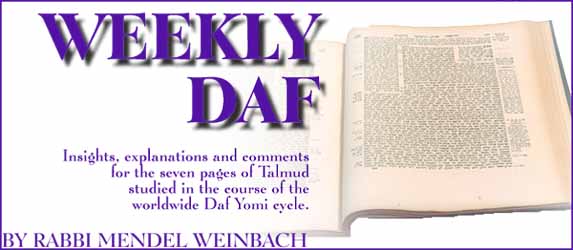Weekly Daf #110
Zevachim 72-78 -- Issue #110
27 Adar - 4 Nissan 5756 / 18-24 March 1996
When Blood is Thicker than Water
| The Rule: | Blood of a sacrifice mingles with water. If the mixture still retains the color of blood, even though the majority is water, it is still considered valid for sprinkling on the altar. |
|---|---|
| The Exception: | This is true only if the water fell into the blood. If the blood fell into the water, however, each drop lost its status as sacrificial blood when it lost its color and cannot regain this status even when it is joined by the following drops in transforming the color of the mixture. |
| The Parallel: | The blood of a fowl slaughtered not for sacrificial purpose must be covered with earth and a blessing is made before covering it as in the case of every mitzvah. |
| The Questions: | What if the fowl's blood mingles with water? Will the same distinction apply as in the case of the sacrifice? |
| The Answer: | Rabbi Papa rules that in regard to the mitzvah of covering the blood it will still be incumbent on the slaughterer even if the
blood fell into the water. The sacred status of sacrificial
blood is lost forever once it was at a stage where its color disqualified
it from the service. However, in regard to mitzvos, there
is an unresolved question in the Talmud as to whether temporary
disqualification creates permanent rejection. As is the case
of every Torah law we must take a stringent approach and perform
the mitzvah of covering the blood even if the obligation is in
doubt.
The commentaries point out that there will still be a practical difference whether the blood fell into the water or vice versa. When blood falls into water there is a doubt as to whether it has been permanently disqualified so even though we perform the mitzvah out of doubt we do not make a blessing in such a case since a blessing is never made in the case of doubt. If the water falls into blood and the mixture retains the color of blood it is covered with a blessing because then the obligation is an unquestioned one. |
The Dubious Sinner
The position of Rabbi Eliezer on the sacrifice known as asham taluy is cited by the Talmud and a suggestion is made that the opinion which disagrees with him (and the one which is accepted by the Halacha) is that of Rabbi Shimon.The asham taluy is mentioned in Vayikra 5:17-19. It is a sacrifice brought by a Jew who has some doubt as to whether he actually committed a sin involuntarily. The classical case is where he has before him two pieces of fatty meat, one which is kosher and the other forbidden with a penalty of kares (early death). He is unaware that either of them is forbidden and eats one of them. He subsequently learns that one of them was indeed forbidden, but he is unaware which of them he ate. He brings an asham taluy (a doubtful sin-offering) until he can determine whether he actually ate the forbidden piece involuntarily and then he must bring a regular chatass sin offering.
Rabbi Eliezer reasons that the asham taluy cannot be viewed as a mandatory sacrifice, because if it were it would achieve the necessary atonement and render superfluous the bringing of a chatass at a later stage. He therefore rules that a man may voluntarily offer an asham taluy every day just in case he may have involuntarily sinned even if he is not aware of such a circumstance.
His view is rejected, however, because we do not find any sin
offering offered voluntarily. The reason why a person is required
to bring such a sacrifice before he is certain that he ate the
forbidden meat is that the Torah had pity on the involuntary sinner
and gave him the opportunity to gain the protection of a sacrifice
against any suffering which he may deserve for his carelessness
until he determines that he actually committed the involuntary
sin and then achieves the absolute atonement of the chatass.
General Editor: Rabbi Moshe Newman
Production Design: Lev Seltzer
HTML Design: Michael Treblow
© 1995 Ohr Somayach International - All rights reserved. This publication may be distributed to another person intact without prior permission. We also encourage you to include this material in other publications, such as synagogue newsletters. However, we ask that you contact us beforehand for permission, and then send us a sample issue.
This publication is available via E-Mail
Ohr Somayach Institutions is an international network of Yeshivot and outreach centers, with branches in North America, Europe, South Africa and South America. The Central Campus in Jerusalem provides a full range of educational services for over 685 full-time students. The Jewish Learning Exchange (JLE) of Ohr Somayach offers summer and winter programs in Israel that attract hundreds of university students from around the world for 3 to 8 weeks of study and touring.
 Copyright © 1995 Ohr Somayach International. Send us feedback.
Copyright © 1995 Ohr Somayach International. Send us feedback.Dedication opportunities are available for Weekly Daf. Please contact us for details.







